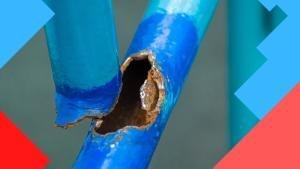The Pros and Cons of Tankless Vs Storage Tank Water Heaters
Every day we get calls to come out and look at water heaters that are malfunctioning in some way and causing trouble. If the unit is leaking water from the top, it might be repaired, but if water is leaking from the bottom of the unit, it will have to be replaced.
We at Mr. Speedy Plumbing are certified distributors and installers for the major brands of water heaters, including Bradford White and Rheem. We carry residential and commercial water heaters in all sizes and capacities.
As the new tankless water heaters become more popular, we get asked a lot of questions about this new technology and whether it is a good idea to go into this type of water heating system. So we decided to answer some of your questions and compare the costs and issues involved when choosing between regular, storage tank water heaters and the new tankless systems.
No Storage Tank – Water On Demand
The main difference between the two types of system is that tankless heaters do not have a storage tank like regular water heaters. Tankless systems heat up water “on demand” whenever you turn on the hot tap. It only heats up the amount of water you need at the time.
There is no storage tank, and you don’t have to heat up more water than you need. For this reason, the tankless type of system uses less power because it has to heat up less water than a storage-tank type of system, which heats up an entire tank of water every time you turn on the hot tap.
Never Run Out Of Hot Water
Another major advantage of the tankless system is that you never run out of hot water. Water will continue to heat up as long as you run the hot water faucet. When a storage tank empties, there is no more hot water until the tank refills and heats up the new water. This takes time and uses even more energy.
It’s All About Cost
So in the end, it all boils down to cost (please excuse the pun). Tankless type water heaters cost significantly more to purchase and install than regular water heaters.
But with a tankless system, you will be faced with lower utility bills from the beginning, and this cost savings must be factored in to the big picture. Tankless systems are solid-state, so they also require less maintenance, and there are fewer components that can go wrong or need servicing or replacement.
The storage-tank type of water heater must be flushed out at least once a year: if you don’t know how to do this yourself, you will need to hire a qualified plumber to do it for you. Since tankless water heaters have no storage tank, they do not need this kind of maintenance or service.
Consider Low-NOx Technology
Today, there is a new type of technology which has lowered the cost of powering a storage-tank type of water heater. It’s called “Low NOx”, meaning these heaters emit a lower amount of nitric oxide and nitrogen dioxide.
Significant cost savings are possible when comparing the energy efficiencies of gas heaters with low NOx emissions with conventional flued types. Gas heaters are flued, and will inherently lose a significant amount of energy in the form of hot flue gases escaping into the atmosphere. Also, the choice of placement of flued heaters is limited due to flue installation restrictions.
Low-NOx May Be Up To 100% Efficient
In contrast, dedicated low emission (Low NOx) gas heaters do not require a flue system. Also, with the introduction of oxygen depletion sensors and thermostatic controls, Low NOx appliances do not place critical reliance on ventilation as was previously the case.
These water heaters may be positioned more conveniently and centralized to obtain optimum warm air distribution. By definition, unflued Low NOx gas heaters are 100% efficient as all heat energy released from the flame is converted to useful heat. So at the end of the day, the newer Low NOx systems may be as efficient and as cost-effective as tankless water heaters.
Consult With A Licensed Professional
Tankless systems and storage tank systems both come in gas-powered and electric-powered options. If your other appliances, such as your stove, are powered by gas or electricity, you should probably go with the same type of power.
If you plan on switching over from a gas-powered heater to an electric-powered heater or vice versa, you should not try installing the new pipes and connections yourself: get a qualified plumber who knows how to do this right. There may also be some building-code issues which your plumber will be able to address



